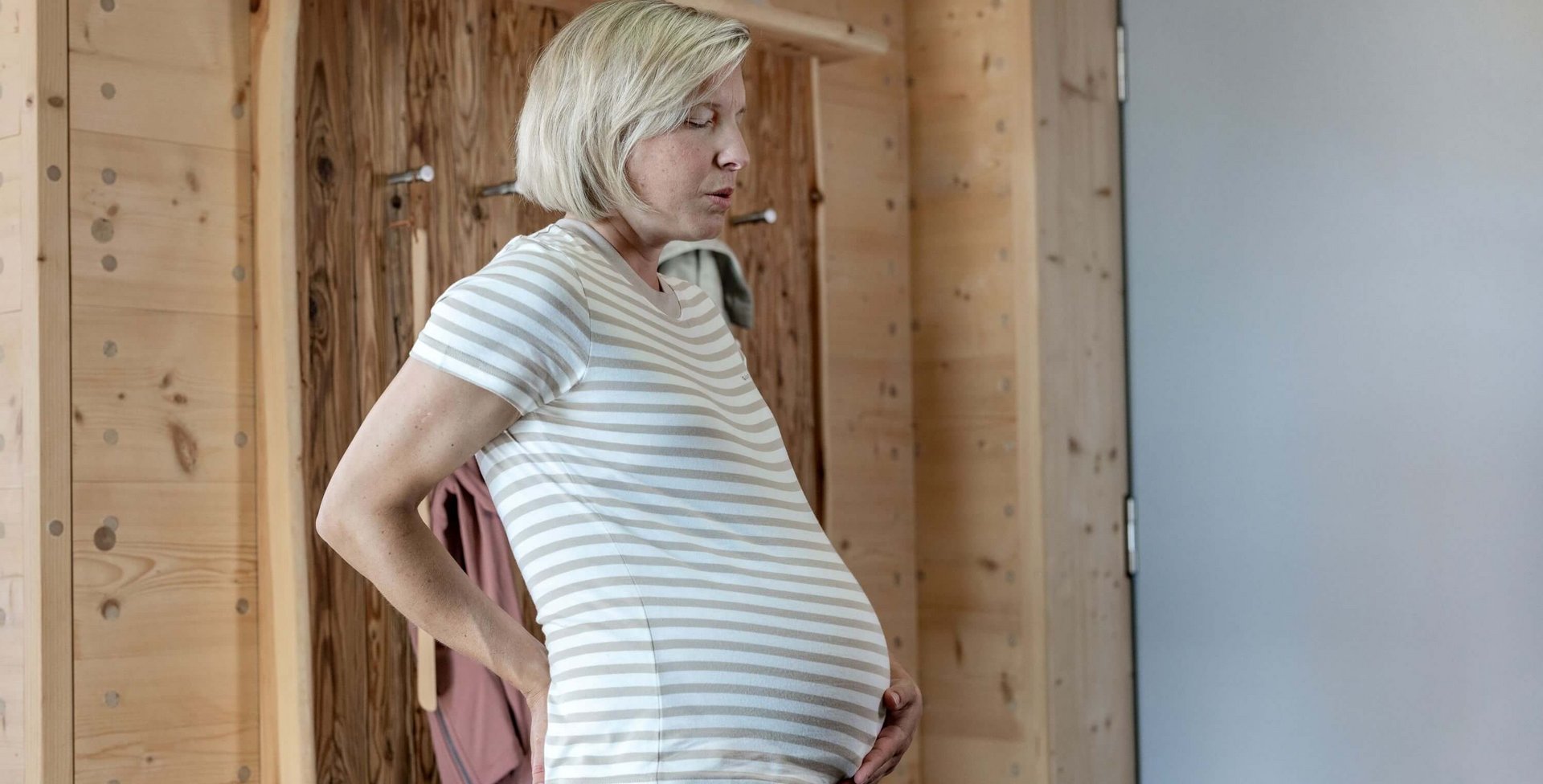
Pregnancy
Back pain during and after pregnancy
Effective relief for your spine
Back pain during pregnancy can represent a real strain. Almost half of all mothers-to-be are affected by it. If you’re also facing this challenge, our article won’t just tell you possible causes. You can also learn what to do to alleviate pain and how to easily manage everyday life before and after giving birth.
Why does back pain occur during pregnancy?
During pregnancy, the body of a mother-to-be changes in many ways to ensure the growing child is perfectly cared for. Some of these changes can cause back pain. This includes weight gain, for example. The additional weight the body temporarily gains and carries subjects the spine to strain. This is also associated with the body’s center of gravity shifting because of the growing baby bump, often resulting in a postural change and therefore serious strain or excessive strain on the back muscles.

Furthermore, there are hormonal changes when the body prepares for the birth of a baby. The production of relaxin, a hormone that loosens the joints, for example, can influence the stability of the spine as well as the pelvic and hip region.
Emotional stress, too, can exacerbate muscle tension and back pain.
Preventive measures and relief
Luckily, there are many ways to prevent and alleviate back pain during pregnancy and postpartum regeneration. We’ve collated seven useful tips for you. Please discuss with your physician which of these tips will specifically benefit you before following them.
Moderate physical activities, such as swimming, going for a walk, or specific maternity exercises, can strengthen the abdominal as well as back muscles and have a positive effect on well-being. Ask your physician which sports or exercises are suitable for you if you’re not sure.
Try to avoid lifting and carrying heavy loads as much as possible. You should also check that your workplace as well as your domestic environment are designed ergonomically, and adapt them to benefit you, if needed. See here for further advice on how to organize your everyday life to suit your back.
Choose flat, comfortable footwear that offers good and secure support. Avoid high heels because they can negatively affect balance and posture.
Sometimes, feet change during pregnancy. Their length or width may increase, and the arches may drop because of the additional body weight and looser ligaments. You can counteract these changes by using suitable orthopedic foot orthoses, such as the ErgoPad Soft style, complete+ or a foot orthosis from the TRIactive range, and by carrying out exercises to strengthen your foot muscles.

Sleep on your side and place a cushion between your knees to relieve your spine. An additional cushion under the belly can also help. You should ensure good sleep quality in general so you wake up refreshed in the morning and have enough energy for the challenges of the day ahead.
Warmth, for example in the form of a hot water bottle, creams, or a heat plaster can relax tense back muscles. Discuss the use of this type of product with your physician to be sure.
Physiotherapy, massages, or acupuncture are further methods for treating pregnancy-related back pain. Speak to your physician to find out which options are best for you.
Making use of support is not just recommended for your physical well-being. As mentioned above, psychosocial factors also play a key role. If being pregnant is a completely new experience for you and your environment, stress, feeling overwhelmed, and possibly anxiety can sometimes occur. Techniques to manage stress, such as meditation, mindfulness exercises, or psychological counseling, can be beneficial.
A lumbar orthosis, such as the Spinova Mum – if the treating physician approves and monitors its use – can gently lift the belly, thus relieving the back. Spinova Mum provides the lumbar spine with relief and stabilizes the pelvic and hip region during pregnancy and postpartum regeneration. Its adjustable strap system adapts to the changing circumference of the belly. The particularly soft fastening, breathable mesh material, and the low weight make the Spinova Mum extraordinarily comfortable to wear.


Find out more about Spinova® Mum
Pregnancy orthosis for reducing lordosis of the lumbar spine and for lifting the belly to provide relief
When should you see a physician because of your back pain?
There are cases when you must seek medical advice with regard to your back pain. These include:
Enjoy your pregnancy
Back pain during pregnancy does not have to control your life. You can experience relief with the appropriate methods and a little mindfulness. This can significantly alleviate your problems so you can enjoy the beautiful aspects of this special time. But if your gut feeling is telling you that something may be wrong, take these sensations seriously and do not hesitate to seek professional help.

In addition to your family physician and gynecologist, a midwife can provide advice with answers to all sorts of questions. People close to you, for example your partner, family members, or friends, can support you when implementing many of the measures mentioned.
It can also be beneficial to get encouragement from other mothers-to-be or to confide in them – there are numerous online as well as offline options to share experiences. This can provide you with valuable tips and emotional support.


